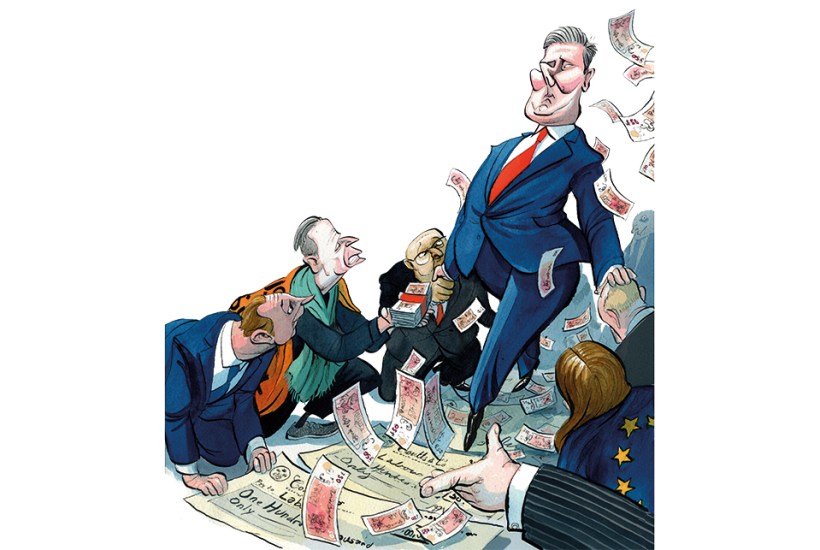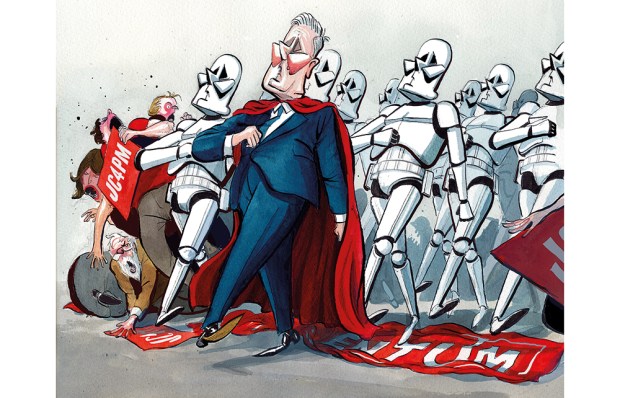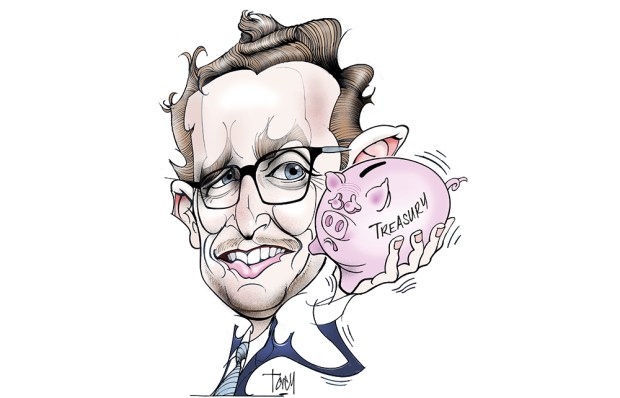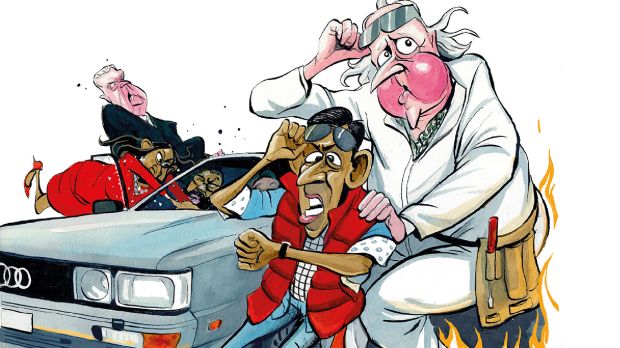The battle for the next Labour manifesto is already under way. ‘I will stay up to 2 a.m. if I need to,’ warned one member of the shadow cabinet ahead of last week’s national policy forum meeting in Nottingham. The trade unions and grassroot members were pushing for radicalism, Keir Starmer for moderation.
Starmer misses no opportunity to make the point that realism, not revolution, is the path to power. He was quick to blame the party’s narrow defeat in the Uxbridge by-election on Sadiq Khan’s support for the extension of London’s Ultra Low Emission Zone. ‘In an election, policy matters,’ he said. ‘And we’re doing something very wrong if policies put forward by the Labour party end up on each and every Tory leaflet.’
Every time there is an internal Labour fight, Starmer gets his way. What he may lack in charisma, he has made up for in his skill as a machine politician: he has the party’s system where he wants it. He has no factions to whom he believes he has to kowtow. So there will be no lifting of the two-child benefit limit, no free school meals for all primary school children, no radical extension of workers’ rights. Furious, the Unite union withheld its support for Labour’s draft manifesto. Momentum, the one-time Corbynite torchbearers, went further, declaring that ‘Britain deserves better’.
The squeals of the Labour left are seen as useful by Starmer’s team, taken as ‘proof’ that the party is ready to ‘change the country in government, built on the rock of economic responsibility’. Yet the reason Starmer can be confident in making such statements is because of the financial stability Labour now enjoys.
Two years ago, Starmer’s party had only one month’s wages left in its reserves. Labour was almost bankrupt from Corbyn-era legal fees and debt from bizarre events like the flop Labour Live festival. When Starmer took over, 100,000 pro-Corbyn members also quit the party taking their membership money with them.
As leader, Jeremy Corbyn funded the party through a growing membership and a close link to the unions. Private donors were hard to find – the number of people giving six-figure sums fell to fewer than ten. His predecessor, Ed Miliband, did slightly better, but his largest donations still came from the unions. Anyone who had enough money to donate feared being rinsed.
Given that Starmer has decided the path to power means moving Labour to the right, he needs the financial plan to accompany it. This means returning to the Blairite model: relying on Labour-leaning millionaires. ‘It’s back to Blair – get a load of centrist dads and run with it,’ explains one insider. So David Evans, Labour general secretary, has had his fundraising role pared down as a result of a desire in the leader’s office for a faster pace on raising private donations. A new operation – spearheaded by the Blairite peer Waheed Alli, who himself has given £500,000 to the party, half of it under Starmer – was set in motion.
The party’s consistent poll lead has proved a turning point. ‘If power looks close, that’s when the money rolls in,’ says one old-timer. When a Labour win looks inevitable, those who seek decent ties with the future government open their chequebooks. Last year represented a breakthrough: the first year since records began that Labour was given more by private donors and businesses (£6.4 million) than by the unions (£5.1 million). It was also the highest amount the party has raised from private sources in a single year since 2008.
The new donors fall roughly into three categories – the most eye-catching of which is defecting Tory backers. Labour has been on a business charm-offensive for some time. It’s rare to find a London-based chief executive who has not been offered breakfast with Rachel Reeves at least twice. All she has to do is listen as business leaders complain that a supposedly Conservative government has left them with surging corporation tax and, overall, the highest general tax in living memory. They ask: can a Labour administration be so much worse?
Reeves’s team and other senior Labour people have done a good job identifying the Tory donors most likely to wobble. ‘A lot of old Tory supporters really despise the government these days,’ says one Starmer ally. Alan Parker, head of advisory firm Brunswick (who asked Gordon Brown to be godfather to his son) has done his bit at introductions to the disillusioned. ‘They seem to be targeting centrist Tories rather than the dyed in the wool ones,’ says one figure privy to the advances. Reeves’s deputy, Pat McFadden, has been known to introduce himself at such meetings as the first minister to be sacked by Jeremy Corbyn, which helps to get his audience on his side.
The events are an exercise in reassurance. ‘They try to give you a very Blairite vibe,’ reports an attendee. In a sign of the party’s pro-business attitude, it was members of the shadow cabinet rather than the government who sounded the most sympathetic this week towards NatWest after the bank’s CEO Alison Rose stood down over the closure of Nigel Farage’s account.
Early defectors include Gareth Quarry, a businessman who donated to David Cameron and Theresa May. He has given Labour £100,000, citing scandal in a Tory party ‘riven with arrogance and complacency’ which led him to the ‘gradual realisation that inequality in this country has got ever more marked’.
Quarry is joined by the hedge fund manager John Armitage who previously gave more than £3 million to the Tories and has switched to Starmer on the grounds that the Tories are in ‘deep shit’ and only Kemi Badenoch as leader could make him reconsider. Kasim Kutay was a Tory donor in the Cameron era but says he backs Starmer whom he calls ‘the first truly serious alternative’ in a ‘long time’. Not that the Tories are too upset. Kutay, who donated £40,000 last year, is the CEO of Novo Holdings, the ultimate parent company of the Danish healthcare giant Novo Nordisk, which was suspended in March from the Association of the British Pharmaceutical Industry for two years over ‘serious breaches’ of its code after the firm was accused of trying to ‘buy influence’ (something the company denies).
Just as Brexit was the gateway drug that took Labour Red Wall voters over to the Tories, it has also had the reverse effect for certain Remainer businessmen. Old Blairite donors are returning to the fold. The Tony Blair Institute is playing a key role behind the scenes and is likely to help provide staff should Starmer take power. Lord Sainsbury gave £2 million last year, following a hiatus in his donations during the Corbyn era. The former chair of the supermarket chain was a big donor under Blair and Brown, but switched his allegiance to Remain campaigns during the referendum. His daughter – the philanthropist Fran Perrin – has chipped in with £1 million and is also helping the party with general fundraising.
Other Blairites coming back include Lord Levy and Sir Victor Blank, who gave Reeves £175,000, making him the shadow chancellor’s biggest personal donor. Lord Levy and Blank are another two of the donors who have a distinctly anti-Brexit feel. Before the referendum, Blank – an ex-Lloyds TSB chairman – described the prospect of the UK leaving the EU as ‘horrific’.
There’s Anthony Watson, too, a former Nike executive and Stonewall donor, who has described himself as ‘very pro-EU’. Gary Lubner, head of the global vehicle glass repair film Belron, has given £500,000 to Labour so far this year, with suggestions that he plans to reach £5 million in total before the 2024 general election. Lubner, the South African son of Jewish refugees, has praised Starmer for his attempts to rid the party of anti-Semitism but ultimately seems driven by a desire to put the Conservatives out of power ‘for a long time’. Of the Tories’ sins, he criticises the party’s migration strategy but sees the greatest as Brexit. ‘In the long list of Tory failures in the last 13 years, Brexit is top of the list,’ he recently said. ‘It’s a disaster. There’s nothing good about it. Nothing.’
Even though Starmer and his front bench insist there are no plans to reverse Brexit, Remainer donors believe a Labour government would at the very least ‘listen to business’ on softening the current arrangement significantly. They hope Labour would do more to align UK regulations with those of the EU, getting as close as it can without formally re-entering the single market, customs union and European Court of Justice.
The final category of donors are the eccentric campaigners. Take Dale Vince, the 61-year-old founder of Ecotricity (and former New Age traveller), who has donated £1.5 million to Labour over the past decade – more than half of it under Starmer. One senior figure in the Tory party describes him as ‘the gift that keeps on giving’, because Labour isn’t the only organisation that Vince donates money to. He has also funded Just Stop Oil, Extinction Rebellion and Animal Rising, the group that disrupted the Grand National. The chair of the world’s first vegan, carbon-neutral football club in Forest Green Rovers, Vince has said that climate change denial is ‘denying the holocaust that is coming’. He insists he does not ‘ask for anything’ in return for his patronage but says he will only give it to groups ‘trying to do some good in the world’.
Even a phone call between Vince and Starmer in May quickly caused a headache for the Labour leadership, leading Sunak to claim that ‘eco-zealots at Just Stop Oil are writing Keir Starmer’s energy policy’. Undeterred, Vince responded by saying he would match any money given to Just Stop Oil for 48 hours. It cost him £340,000. Starmer seems a little less enthused by the attention. His team played down the call as a simple ‘thank you’.
Starmer may now be able to say that the unions aren’t the ones calling the shots. But as Labour gets closer to power, questions over the influence and demands of its new paymasters will only grow louder.
Got something to add? Join the discussion and comment below.
Get 10 issues for just $10
Subscribe to The Spectator Australia today for the next 10 magazine issues, plus full online access, for just $10.
You might disagree with half of it, but you’ll enjoy reading all of it. Try your first month for free, then just $2 a week for the remainder of your first year.















Comments
Don't miss out
Join the conversation with other Spectator Australia readers. Subscribe to leave a comment.
SUBSCRIBEAlready a subscriber? Log in